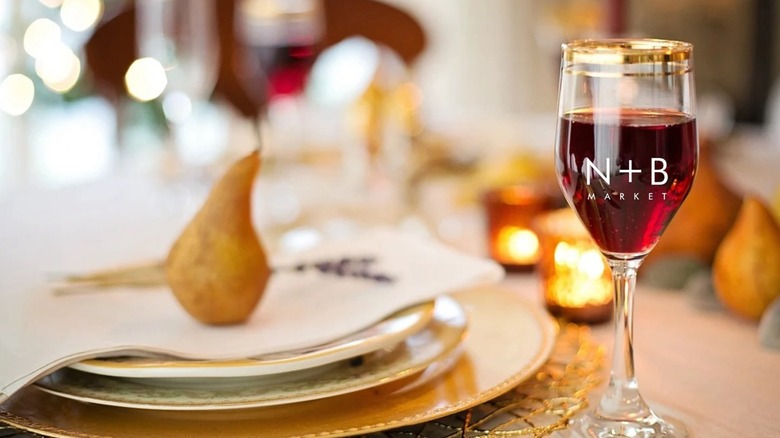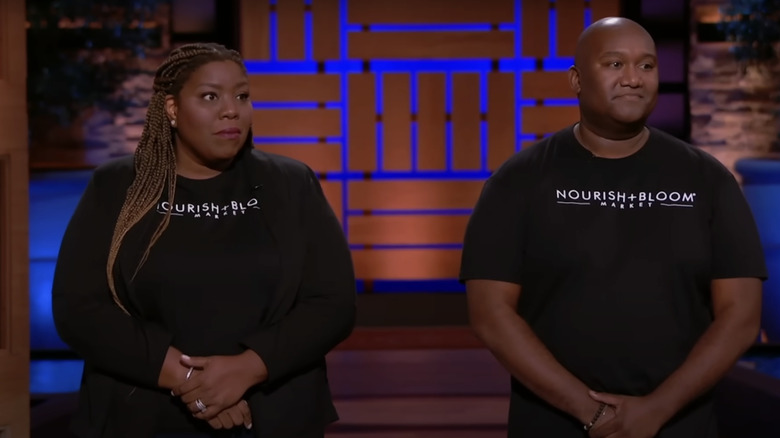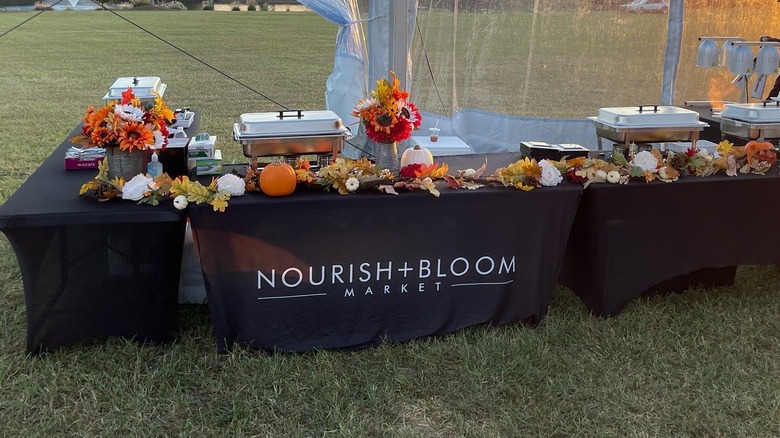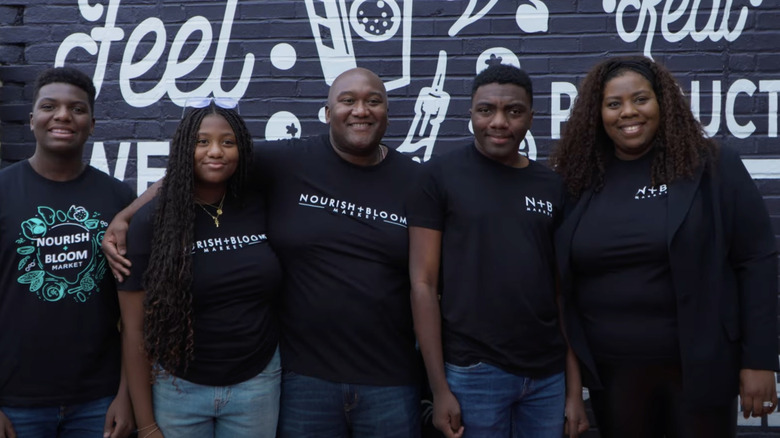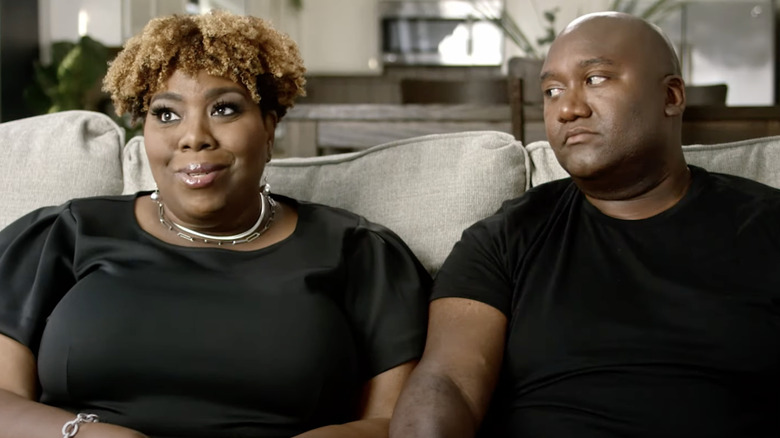Nourish Bloom + Market: Here's What Happened After Shark Tank
When Jamie Michael and Jilea Hemmings launched Nourish + Bloom Market in 2022, they had some lofty goals. They opened the first Black-owned autonomous grocery store in the world, and much like when Everytable appeared on "Shark Tank" with a similar mission, they also wanted to provide a solution for the 5.6% of Americans living in food deserts across the United States (per USDA). How? By eventually opening 500 of their micromarkets across the country. With one 1,500-square-foot store, offering produce, meat, baked goods, dairy, and prepared meals, already opened in Fayetteville, Georgia, they hoped to achieve those goals, in part, with a $400,000 investment from at least one of the entrepreneurs on "Shark Tank."
Jamie was inspired by his own experience growing up in White Plains, New York, where he shopped at a corner store offering cinnamon buns, ice cream, and "quarter waters," a nickname for brightly-colored sugary drinks (via YouTube). The Hemmings were also motivated by their eldest son, who was diagnosed with autism at age 2. "We wanted to build something for him to help him in the future," Jamie said, noting that his and Jilea's research into the disorder showed that healthy meals could help children on the spectrum.
Undaunted by others' previous attempts at the automated grocery business –- including the failure in the 1930s of Keedoozle, a venture of the Piggly Wiggly founder Clarence Saunders –- the Hemmings met the Sharks on Season 15, Episode 18 of the show.
What happened to Nourish + Bloom on Shark Tank
The Hemmings asked for $400,000 for 5% of Nourish + Bloom. Their market, Jamie claimed, could "eradicate a food desert in just three months" (per YouTube). Using proprietary AI technology, the store concept allowed customers access to the minimally staffed store using an app linked to a credit card. Expansion plans included four different store formats: brick and mortars, 300-square-foot shipping containers, smart vending machines, and satellites in hotels. Jilea predicted the containers would be most profitable, noting the outlets should yield a 25% net profit.
Jilea referred to their flagship (and only) store as a "proof of concept." Although it had generated lifetime sales of $800,000 — $22,000 in the previous month — it was not yet profitable. New stores, Jilea told the Sharks, would cost $400,000 to build. In total, the Hemmings had raised $1.3 million from family, friends, and a Small Business Administration loan and had received $250,000 in convertible notes — all of which they had burned through.
Kevin O'Leary noted they were in three different sectors: real estate, fresh food logistics, and tech. The self-proclaimed Mr. Wonderful also noted the traditionally thin margins involved in the grocery sector. The complicated model also scared off guest Shark and horror film producer Jason Blum, who thought the business would be better positioned as a non-profit. Mark Cuban pulled out, but promised to introduce the couple to officials in Dallas and in Texas if needed. Remaining Sharks Barbara Corcoran and Lori Greiner also declined to invest.
Nourish + Bloom after Shark Tank
Perhaps the Sharks weren't ready to dip their toes into the world of automated mealtimes so soon after Chefee Robotics sought — and received — a "Shark Tank" investment for its meal-prepping robot. Still, viewers appeared to be intrigued. In the first few days after the episode aired, Jilea Hemmings told Bloomberg that they had been contacted by several funders and investors. Several cities had also reached out to find out how the technology might help their food equity issues.
The Hemmings don't seem to be the type of people who are easily daunted. Nourish + Bloom, after all, was not their first entrepreneurial venture. Jamie had founded a couple of technology consulting companies and, with his then preteen daughter, created Stretchy Hair Care detangling clips. Jilea, meanwhile, created a line of all-natural, meatless entrees for kids, called Greenie Tots, while still recovering in the hospital from the birth of her second son, and was the founder and CEO of a business consulting firm for entrepreneurs. Both Stretchy Hair Care and Greenie Tots are no longer in business.
In addition to operating a bistro with prepared foods out of the Fayetteville store, the Hemmings expanded with an additional store in the Cascade Heights section of Atlanta in the fall of 2024. The founders have also partnered with other community businesses to promote STEM learning and entrepreneurship.
Is Nourish + Bloom still in business?
The Hemmings are still operating the Fayetteville and Atlanta stores and also received two grants from Invest Atlanta — one for $600,000 and another for $50,000 — to open two container-size stores in the city and increase access to fresh food in underserved areas. One store will be located in Pittsburgh Yards, a co-working and office space, and one in an undetermined location in the city's District 11. The store at Pittsburgh Yards is expected to employ two full-time staff members and two part-timers and to serve 5,000 customers per month.
In May 2025, Nourish + Bloom became the first autonomous grocery store in the United States to accept Supplemental Nutrition Assistance Program (SNAP) Electronic Benefits Transfer (EBT) cards, the system that replaced food stamps. Although select Amazon Go stores now accept EBT cards, the retail giant's automated stores did not take food stamps when it first launched in 2018. "Customers can now enter the store, select their items, and walk out — without waiting in line or stopping at a register," Jilea Hemmings said in a press release. "This upgrade allows all shoppers to experience the same convenience that autonomous retail provides."
What's next for Nourish + Bloom?
Nourish + Bloom appears to still be anticipating the opening of its two new Atlanta locations. Renderings of the stores are similar to those shown during the couple's "Shark Tank" episode. In June 2025, the micromarket founders announced on Instagram that they plan to team up with chefs from Atlanta's food truck scene. Although plans call for rotating collaborations, it's unclear how the partnerships will work.
Jilea Hemmings also demonstrated some expanded uses of their frictionless, no-touch technology at Atlanta Tech Week in June 2025. One is a smart cooler that uses AI and sensor fusion to allow access to various food items 24 hours a day. In the non-food space, Nourish + Bloom is offering the technology for smart lockers that can be used for high-value items, smaller devices for hotel rooms, and power devices. The company also initiated a round of crowdfunding via Wefunder and had raised just over $10,000 of its $58,000 goal in early July 2025.

